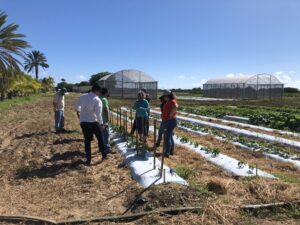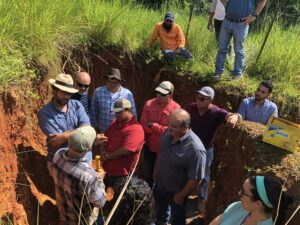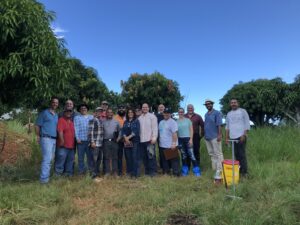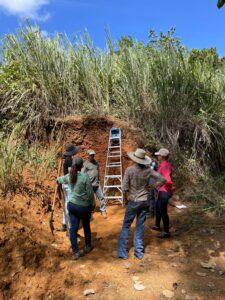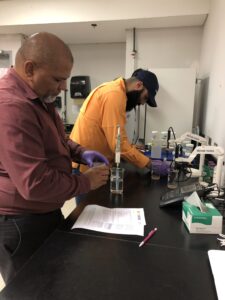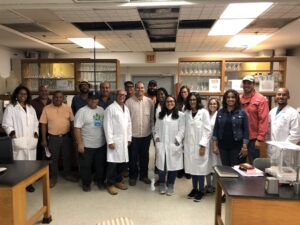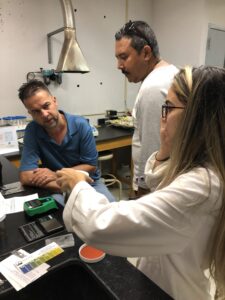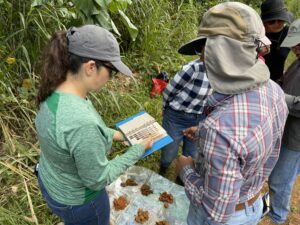Final report for ES20-152
Project Information
The objective of this project is to provide soil nutrient management training for the agricultural agents of the Agricultural Extension Service (SEA) of Puerto Rico. The SEA agents impact hundreds of farmers throughout the year, and provide informal education to improve their yield. They require adequate training by specialists to improve the information and education they provide to their target audience. The goal is to instruct the agents and provide them with the resources to then teach and support the farmers in their respective areas.
The overall objective of this project is to provide soil nutrient management training for the agricultural agents of the Agricultural Extension Service (SEA) of Puerto Rico.
The individual objectives of the project are the following:
- Provide training in soil sampling, soil analysis interpretation, nutrient recommendation, soil nutrient management, and soil quality/health for the agricultural agents. This training will be given to each of the 5 regions (Arecibo, Gurabo, Mayaguez, Ponce, San Juan) of SEA that cover Puerto Rico. SEA is comprised of 54 local offices with 60 Agricultural Agents that serve 1167 farmers throughout the island.
The training will be comprised of three full-day sessions that will occur over the course of one year. A simple post- training questionnaire will be provided to participants using an online survey to confirm increase of knowledge on the subject.
- Produce technical notes and at least three videos on soil related topics pertinent to tropical agriculture in Puerto Rico throughout the life of the project. Views will be reported as they are uploaded to the website.
- Develop a website where soils information, publications and videos can be accessed. One website and social media accounts (facebook, instagram) will be developed and the number of videos uploaded and watched will be reported to address accessibility and outreach.
- Create an agricultural fertilizer calculator that can be used online or as an application on a phone. Provide different options of agricultural fertilizer calculator apps in Spanish and English (as available) to be posted on the website and social media for use by agents and farmers throughout the life of the project.
- Purchase soil sampling and field analysis instruments that each region can house and that both the agricultural agents and farmers can use, allowing for implementation of knowledge acquired through the proposed initiative.
Education
Workshops on soil sampling, soil analysis interpretation, nutrient recommendation, nutrient management and soil quality/health will be conducted. The target audience will be the Agricultural Extension Service (SEA) agents. The workshops will be comprised of classroom presentations and in-field instruction and will be given in each of the five SEA regions of the state of Puerto Rico. In addition to the workshops, technical notes and videos will be produced to supplement the workshop instruction. The goal is to instruct the agents and provide them with the resources to then teach and support the farmers in their respective areas.
Education & Outreach Initiatives
Provide training in soil sampling, soil analysis interpretation, nutrient recommendation, soil nutrient management, and soil quality/health for the agricultural agents.
Six workshops on soil sampling, soil analysis interpretation, nutrient recommendation, nutrient management and soil quality/health were provided for the agricultural agents from the Agricultural Extension Service (SEA) in Puerto Rico. These workshops were comprised of classroom presentations and interactive activities. SARE resources were utilized, including the interactive infographic 'Soil Health', the manual 'Building Soils for Better Crops' and the videos 'Improving Soil Health Through Cover Crops' and 'Visualizing Soil Properties'. The objective was to train the agents and equip them with resources to effectively educate and support farmers in their respective areas.
Two specialized training sessions focused on soil fertility and nutrient management in vegetable crops, specifically solanaceae and cucurbits. These trainings took place at the agricultural extension farm in Juana Diaz, Puerto Rico. Ten agricultural agents responsible for serving the municipalities in the southern region of Puerto Rico where the majority of commercial vegetable crops are grown, participated in these training sessions.
In 2021 and 2022, more than 33 training sessions on soil management and fertility were offered by agricultural agents, with 130 farmers in attendance. Soils samples were collected and analyzed from over 65 farms, and the results were discussed with farmers, providing them with appropriate recommendations. Collaborative efforts between PRAES and NRCS led to the dissemination of soil nutrient management information to farmers, producers and the general public.
One notable success story involved a new eggplant farmer in a town located in the northern region of PR. The farm was previously dedicated to forage production for cattle. Through multiple visits, training sessions, and recommendations from the local agricultural agent, the farmer successfully reduced fertilizer application by 75% while maintaining eggplant vegetable quality and production. Alongside these visits, the farmer gained valuable knowledge about the significance of plant nutrition, interpreting soil test results, as well as identifying beneficial insects and implementing practices for plant pest control. Encouraged by this achievement, the farmer is currently in the process of establishing a second farm.
Provide field and laboratory training in evaluating soil properties, soil sampling, soil analysis and soil analysis interpretation for the agricultural agents.
Field and laboratory training was provided to agricultural agents from the Agricultural Extension Service (SEA) in Puerto Rico. The training began with the agents spending the first part of the day in the field at the Alzamora Farm (University of Puerto Rico, Mayaguez) where they evaluated soil properties and collected soil samples from a soil profile. The second part of the day took place in Dr. Miguel Munoz's soil chemistry laboratory where the agents conducted physical and chemical soil analyses. In the laboratory, the participants were divided into groups and rotated between stations, each focusing on a specific laboratory analysis. Seven undergraduate and graduate students from the department of Agro-environmental sciences at the University of Puerto Rico, Mayaguez facilitated the training at each of the stations in the laboratory.
The training titled "Integrating the evaluation of soils from the field to the laboratory" was initially provided to two of the five SEA regions (Arecibo, Mayaguez) that cover Puerto Rico in 2019-2020, with more than 25 agricultural agents in attendance. The trainings for the remaining three regions (Ponce, Caguas, San Juan), which were initially postponed due to COVID restrictions at the University of Puerto Rico, Mayaguez campus, were completed in the fall of 2022 and included the participation of 35 agricultural agents.
The soil conservation and nutrient management trainings conducted in 2021 and 2022 have led to the implementation of practices and recommendations that have significantly improved conditions on over 95 farms. Twenty farmers incorporated the use of soil amendments based on soil fertility results and 19 farmers made adjustments to their fertilizer formulations to better align with the specific needs of the crops they cultivated.
A total of 87 individuals have adopted recommended conservation practices to effectively mange the soil on their farms. These practices have contributed to the preservation of soil quality and sustainable land management.
The combined efforts of these farmer and individuals have resulted in notable improvements in soil conservation and nutrient management across the region, promoting sustainable agriculture and ensuring the long-term viability of agricultural practices.
Produce website and educational videos on soil-related topics relevant to tropical agriculture in Puerto Rico.
As part of the project, a website and social media presence were established under the name SoilVersity. Additionally, a web-based lime application calculator was developed and made available in both English and Spanish to assist farmers and agricultural professionals.
Several educational videos in Spanish were produced as part of the Nuestra Tierra Habla podcast series, covering key soil-related topics such as:
- Cuidado de una Calicata
- Importancia de una Calicata
- ¿Qué es biochar?
- Biochar production in Puerto Rico
- Soil Health with NRCS
A short video on how to sample soils for laboratory analysis was produced in Spanish with English subtitles in coordination with a NRCS Puerto Rico urban agriculture initiative and made available on YouTube.
The video can be found using the following link.
The YouTube video titled 'Manejo de Suelos' has surpassed 300 views, leaving a positive impact on viewers interested in soil sampling and management in Puerto Rico. Viewers have left comments in appreciation of the valuable information contained within the video.
